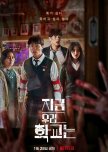Deze recentie kan spoilers bevatten
Students Fight For Their Lives Inside Of A School Overrun By Zombies
In spite of all the horror and struggle for survival, there is still room for the heart in "All of Us Are Dead." While not specific to South Korean culture, it's unsurprising that the story was born in South Korea, a country where the brutal educational system exposes youth to immense pressure. The demand for high performance is among the highest globally. Bullying often becomes an outlet for stress, leaving the bullied doubly burdened. Other escapes include withdrawal, drugs, or even suicide. South Korean society largely turns a blind eye or remains helpless against this. The pressure to succeed, along with the psychological suffering of the young, is seen as an inevitable cost of nationwide (and global economic) competition. As a result, youngsters are left alone to navigate this merciless world. This scenario, perhaps less blatantly, is familiar to youth in many countries worldwide.
This is where "All of Us Are Dead" makes its mark with its impressive and striking portrayal. The original title, which translates to "Currently at Our School," focuses on the school and its students. The horror of everyday school life, which varies in intensity for different individuals, escalates into a universal horror. A desperate father attempts to help his suicidal son confront his bullies through a dangerous experiment that goes awry. The resulting vicious, zombie-like virus spreads throughout the city and beyond, necessitating disaster control, a state of emergency, and martial law. Despite these measures, the young people are once again left to fend for themselves in their existential crisis.
The storytelling and depiction of various group and relationship dynamics among the young characters showcase high-end KDrama quality—intense, powerful, sensitive, and excellent. The narrative's strength lies in this aspect, making it worth watching.
The drama also parallels the global struggle during the Covid pandemic. When established rules are overridden, individuals in power—whether arbitrary or scientifically based, rational or irrational, often driven by fear—make decisions from a safe distance. Quickly, individual concerns are overshadowed by the bigger picture.
"All of Us Are Dead" is a demanding KDrama in multiple respects. Despite the horror and survival struggle, there is still room for emotional depth. However, the show also features a virus turning people into flesh-eating zombies. The abundance of screaming, rattling, biting, and blood-smeared zombie scenes, lacking aesthetic appeal, is integral to the story. The drama is brutal, catering to the international zeitgeist and staged accordingly for the global Netflix audience. While the brutal details and zombie screen time could be less prominent, fans of the genre appreciate this aspect.
From the first moment I watched "All of Us Are Dead," I was hooked. The intensity and emotional depth of the series were unlike anything I had experienced before. As someone who enjoys a well-crafted story with strong character development, this KDrama delivered on all fronts. The way it delved into the psychological and emotional struggles of the characters, set against the backdrop of a zombie apocalypse, was both captivating and heart-wrenching.
One of the most compelling aspects of the show was its portrayal of the South Korean educational system and the immense pressure it places on students. The opening scenes of the series highlight the daily struggles of the students as they navigate their way through school life, dealing with bullying, academic pressure, and personal issues. This realistic depiction of the students' lives before the outbreak made their subsequent fight for survival even more poignant.
The character dynamics in "All of Us Are Dead" were a standout feature for me. Each character had a unique background and set of motivations, which added depth to the story. The way the series explored the relationships between the students, their teachers, and their families created a rich tapestry of human connections. I found myself deeply invested in the characters' fates, rooting for their survival and mourning their losses.
The series also did an excellent job of highlighting the societal issues faced by South Korean youth. The themes of bullying, mental health, and the pressures of academic performance were woven seamlessly into the narrative. These issues were not just used as plot devices but were integral to the characters' development and the story's progression. It was a stark reminder of the real-world challenges faced by young people in South Korea and many other countries.
As the zombie virus spread, the series shifted into high gear, delivering some of the most intense and thrilling scenes I have ever seen. The portrayal of the outbreak's chaos, the students' desperate attempts to survive, and the authorities' struggle to contain the virus was executed with precision and skill. The series maintained a relentless pace, keeping me on the edge of my seat from start to finish.
The parallels between the fictional outbreak and the real-world Covid pandemic were impossible to ignore. The series' depiction of quarantine measures, the spread of the virus, and the fear and uncertainty experienced by the characters resonated deeply with my own experiences during the pandemic. It was a powerful reminder of the fragility of our world and the importance of resilience and hope in the face of adversity.
In terms of production quality, "All of Us Are Dead" was top-notch. The cinematography, special effects, and makeup were all outstanding, creating a visually stunning and immersive experience. The zombie scenes, while brutal and graphic, were a testament to the show's commitment to authenticity and realism. The attention to detail in the portrayal of the virus and its effects on the human body was both impressive and horrifying.
Despite the horror and gore, the series never lost sight of its emotional core. The moments of humanity and compassion between the characters provided a much-needed counterbalance to the relentless violence. The scenes of friendship, sacrifice, and love were some of the most memorable and impactful moments in the series. These emotional beats made the characters' struggles feel real and grounded, allowing me to connect with them on a deeper level.
The ending of "All of Us Are Dead" left a lasting impression on me. Without giving away any spoilers, I can say that it was a fitting conclusion to a story that was as much about human resilience as it was about survival. The final scenes were both heartbreaking and hopeful, leaving me with a sense of closure and satisfaction.
In conclusion, "All of Us Are Dead" was an unforgettable experience for me. It combined intense action, emotional depth, and thought-provoking themes to create a truly exceptional KDrama. The series not only entertained but also offered a powerful commentary on the pressures faced by young people in South Korea and beyond. It was a rollercoaster of emotions, from the thrill of the chase to the heartbreak of loss, and it left me eagerly anticipating more from this talented team of creators. For anyone looking for a high-quality drama that goes beyond the typical zombie fare, "All of Us Are Dead" is a must-watch.
Vond je deze recentie nuttig?


 1
1 1
1























